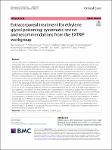Item Infomation
Full metadata record
| DC Field | Value | Language |
|---|---|---|
| dc.contributor.author | Marc, Ghannoum | - |
| dc.contributor.author | Sophie, Gosselin | - |
| dc.contributor.author | Robert S., Hoffman | - |
| dc.date.accessioned | 2023-03-23T01:50:16Z | - |
| dc.date.available | 2023-03-23T01:50:16Z | - |
| dc.date.issued | 2023 | - |
| dc.identifier.uri | https://link.springer.com/article/10.1186/s13054-022-04227-2 | - |
| dc.identifier.uri | https://dlib.phenikaa-uni.edu.vn/handle/PNK/7077 | - |
| dc.description | CC BY | vi |
| dc.description.abstract | Ethylene glycol (EG) is metabolized into glycolate and oxalate and may cause metabolic acidemia, neurotoxicity, acute kidney injury (AKI), and death. Historically, treatment of EG toxicity included supportive care, correction of acid–base disturbances and antidotes (ethanol or fomepizole), and extracorporeal treatments (ECTRs), such as hemodialysis. With the wider availability of fomepizole, the indications for ECTRs in EG poisoning are debated. We conducted systematic reviews of the literature following published EXTRIP methods to determine the utility of ECTRs in the management of EG toxicity. | vi |
| dc.language.iso | en | vi |
| dc.publisher | Springer | vi |
| dc.subject | Ethylene glycol | vi |
| dc.subject | acute kidney injury | vi |
| dc.title | Extracorporeal treatment for ethylene glycol poisoning: systematic review and recommendations from the EXTRIP workgroup | vi |
| dc.type | Book | vi |
| Appears in Collections | ||
| OER- Y học- Điều dưỡng | ||
Files in This Item:

